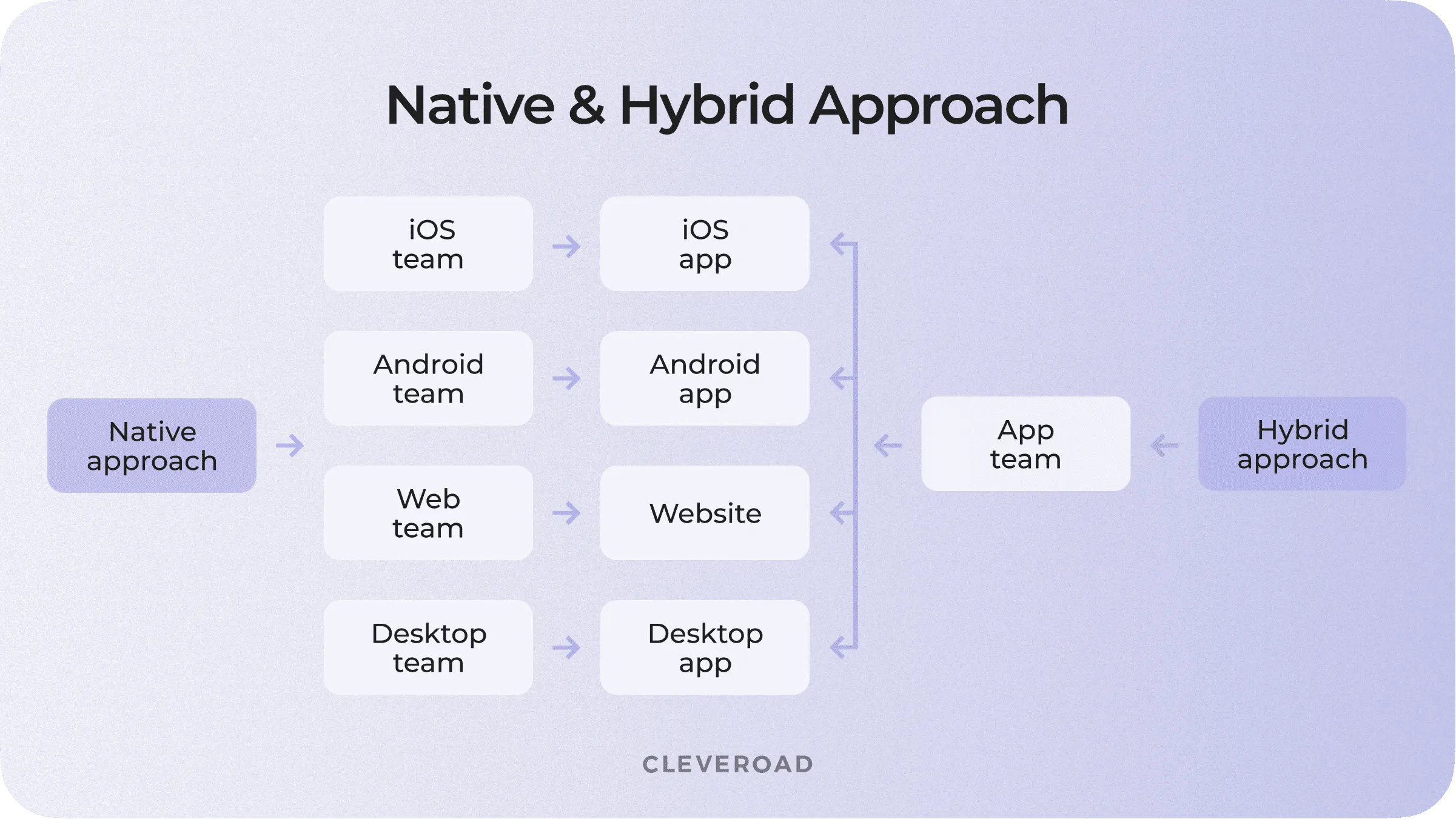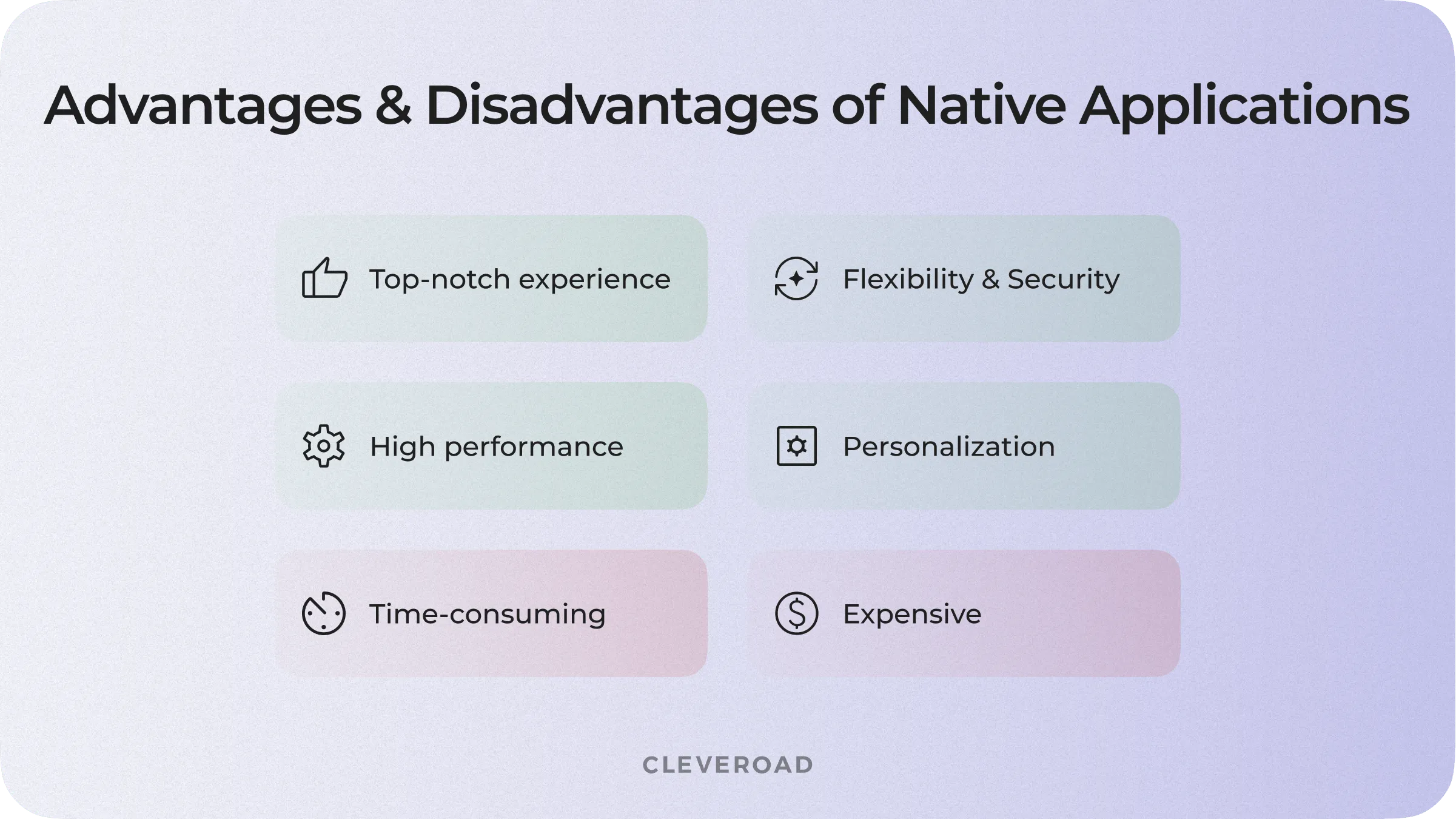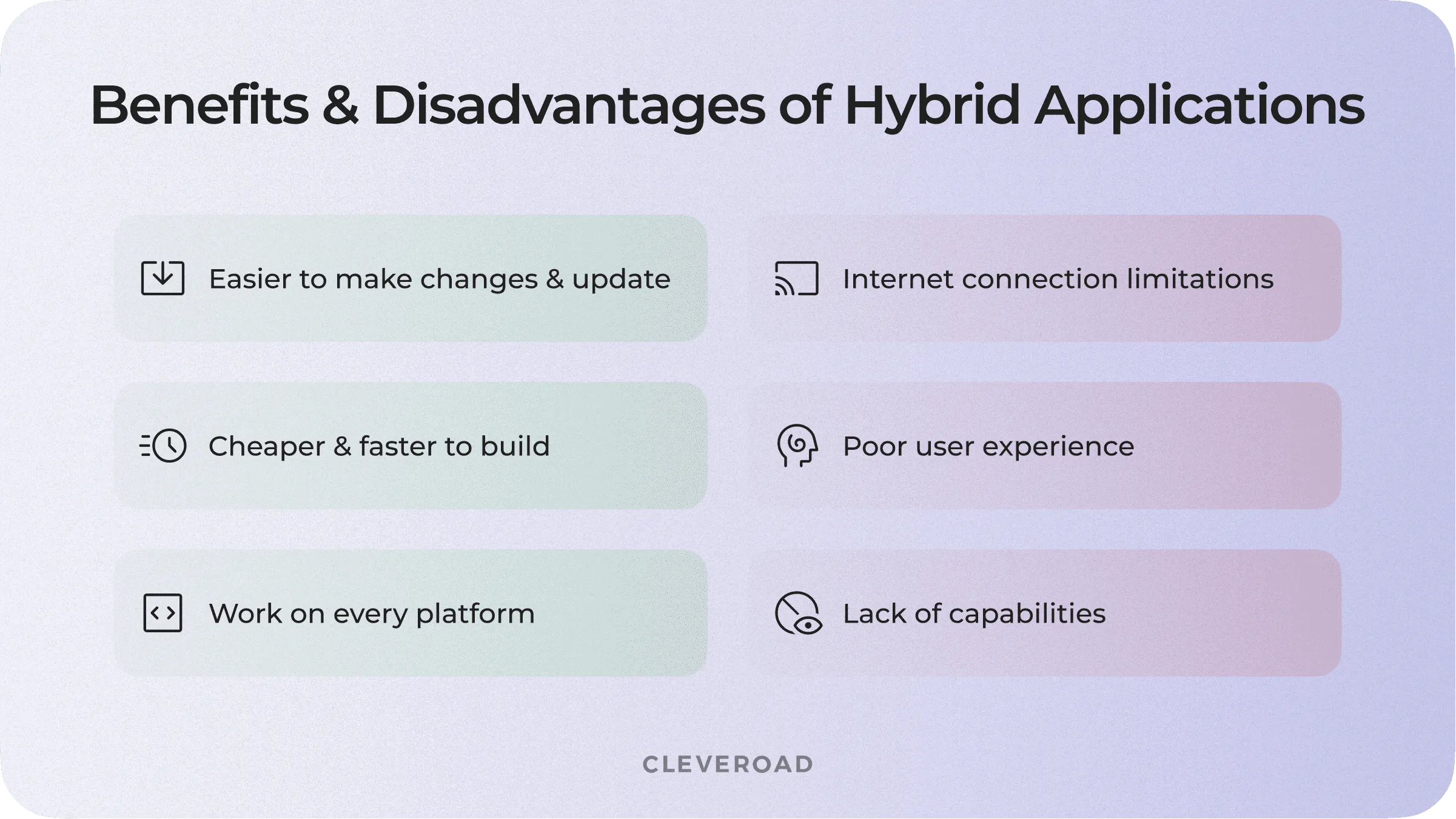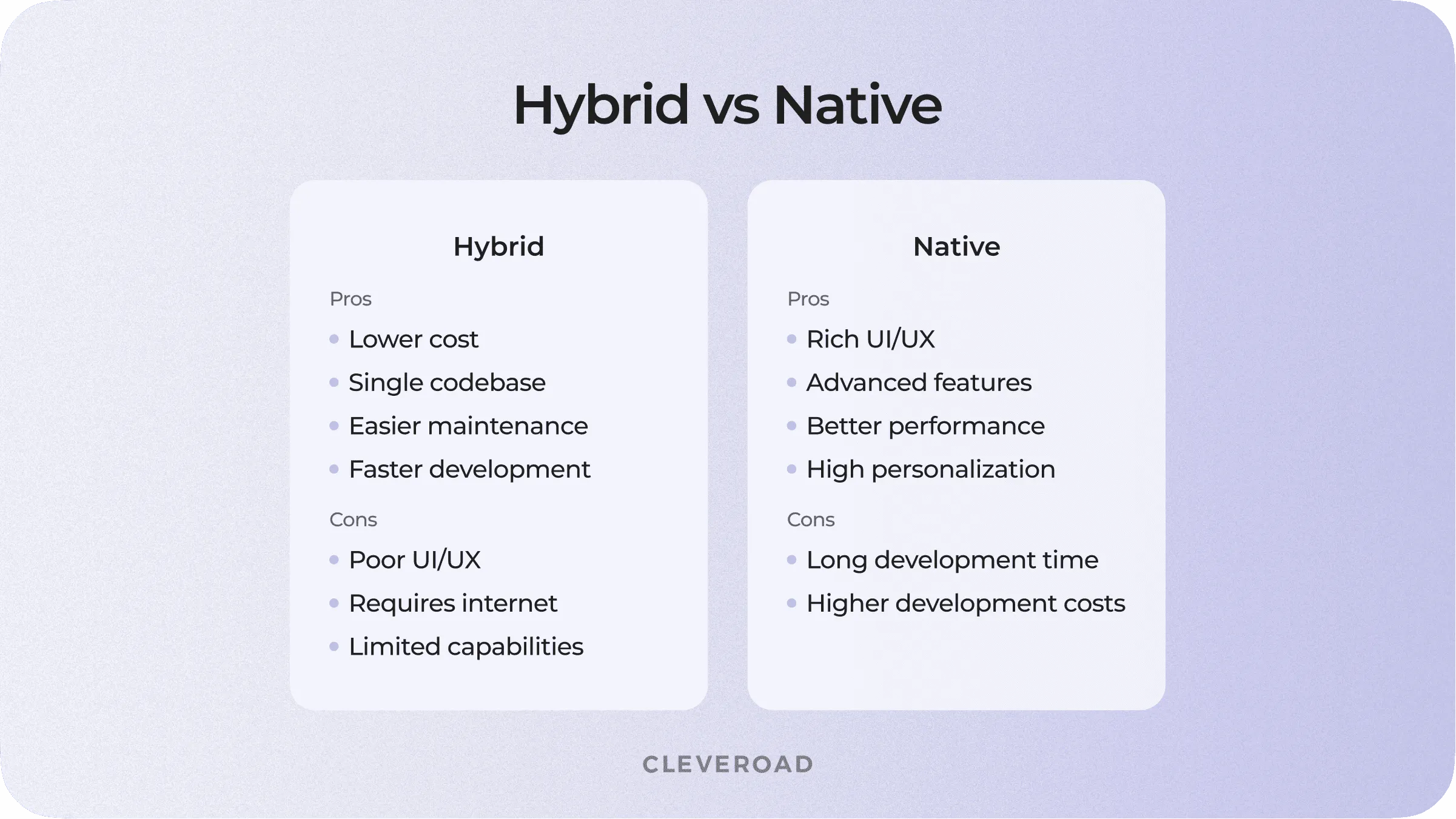Hybrid vs. Native App Development: Which Approach to Choose?
Updated 01 Mar 2023
12 Min
15430 Views
The development of mobile applications is all about making informed decisions. Being a stakeholder, you should consider numerous factors to create a powerful and cost-effective solution. The development method is among those factors, and many entrepreneurs wonder who’s the winner in the fight between native apps vs. hybrid apps.
Let’s figure that out! In this article, we talk about the pros and cons of native apps vs. hybrid apps and try to find out which development method is more suitable for your case.
What Is the Difference Between Native and Hybrid Apps?
The main native and hybrid app difference is that the native mobile solutions are developed for a specific platform like iOS or Android, considering all its features. On the other hand, hybrid applications are technically websites put into a native app to look and function just like them. Moreover, hybrid solutions leverage cross-platform capabilities and use one code base to cover multiple platforms, contrary to native applications. However, despite the contrast between native apps and hybrid apps, both can be distributed through official marketplaces like App Store and Google Play.
Diving deeper into technical peculiarities, we should mention that native apps are built with programming languages that are officially supported by the platform. For Android, those languages are Java and Kotlin, while for iOS, Objective-C, and Swift. Hybrid apps are created with the help of web technologies like JavaScript, CSS, and HTML that are combined together.

Principles of hybrid vs native app development
In addition to this, hybrid mobile app vs. native differ in other parameters:
Development time and cost. Hybrid applications are faster to develop and easier to maintain because of a single code base. Accordingly, development costs will also be lower than for native applications.
Platforms coverage. If you plan to create an application for only one operating system, you can turn to native development. However, if it is necessary to develop software for several platforms simultaneously, the hybrid code will allow the creation of a single application covering all of them.
User experience. Native apps are superior to hybrid apps since they are developed considering all the features of the target operating system. This way, they can provide smoother, faster operation and better integration with hardware.
User interface. Native apps consider the peculiarities of the platform’s interface, making the UI more easily understood. Modern hybrid applications have reached a high level of UI, so if you cooperate with a professional software provider, the difference will be almost invisible. The starkest hybrid app examples are Uber, Instagram, and Twitter. Did you know those were hybrids?
Using device features. If your app needs to leverage features such as GPS or camera, it is worth turning to native development, as hybrid solutions have limitations on using some features.
| Criteria | Native | Hybrid |
Platforms | iOS or Android | All platforms |
Programming languages | Objetive-C/Swift or Java/Kotlin | JavaScript, CSS, and HTML |
Development time & cost | Higher | Lower |
UI/UX | Rich | Poor |
Features | Basic + advanced | Basic |
Hardware usage | Unlimited | Limited |
Codebase | Separate codes | One codebase |
Pros and Cons of Native Application
Native apps are created specifically for an operating system. They stick to the guidelines intended to enhance and align the user experience within the OS. Let’s take a closer look at the advantages and disadvantages of such solutions.

Pros and cons of native apps
Advantages of native apps
It’s always better to start with the positive sides, so let’s first consider the benefits of native apps.
Rich user experience
This is an undeniable advantage of native apps. Mobile developers and UX designers can focus their efforts on tailoring the app’s functionality to one platform that has its own design language, unique elements, and set gestures.
All this allows you to achieve a sense of unity and allows users to more intuitively navigate through the interface as well as better understand the functionality of your application.
In addition, native applications can fully use offline mode capabilities, while everything isn’t as easy with hybrid apps. Developers can face tons of problems during the implementation of offline mode.
High performance
Considering hybrid vs. native app development, we should address the performance question. The application that was created and optimized for a specific platform can demonstrate an unbelievably high level of performance. Developers deal with battery and memory consumption to reach decent results.
However, native apps perform fast not only because of optimization but the code itself. It works faster as it’s written in the programming language natively supported by the platform. What’s more, this allows integrating new features way faster.
Security matter
Creating a native app is the only way to guarantee your users reliable data protection. It’s all about mathematics. The full power of hardware should be engaged to process tasks, and hybrid applications can’t make the most of hardware.
Full-fledged functionality
If you’re looking for reasons why native apps are better, we should stress that they have the full access to databases, and hardware features of a device. Moreover, their functionality isn’t limited to plugins or any other third-party tools.
Native applications have no limitations related to the creation of interface as they don’t have to consider the peculiarities of several operating systems to meet the requirements of each one.
Personalization
Fragmentation makes it hard to adjust the layout for different devices. This is especially true for Android-based devices. Native development is the only way to keep the design at a high level and deliver a great experience to all users of your product.
Explore 5 best personalization tools to improve user engagement
Disadvantages of native apps
Finally, let's consider the weaknesses of native app development.
Cost of development
The process of developing the native app is complex and requires the participation of more qualified staff. That’s why you can expect considerable spending.
Time of development
This kind of app requires more time to be built. If you need apps for both platforms and need them fast, you better think about simultaneous development.
Native development technologies
When developing a native application, the technology stack will depend on the operating system chosen:
iOS. To build an application for this platform, developers can use the following programming languages: Objective-C or open-sourced Swift. The latter is currently used more often.
Android. Native Android applications are created using Java and Kotlin, which are also open-sourced. More often, Kotlin replaces Java because it is newer.
Pros and Cons of Hybrid Application
Before you make a decision to build a hybrid app, you should be aware of its strengths and weaknesses. As we’ve already mentioned, these apps are originally websites packed into native containers. In turn, to access native features, hybrid applications have to use specialized APIs. This way, the capabilities of these applications may be limited because of the necessity to engage third-party tools to access certain features.
Hybrid application development is considered to be a good fit for products focused on content. However, if you need something complex, this may either dramatically increase expenses or be impossible to implement.
So, here is what you should know if you consider the hybrid app development option.

Pros and cons of hybrid apps
Advantages of hybrid apps
Let’s first talk about the benefits of hybrid apps and then move to their drawbacks.
Work across multiple platforms
Cross-platform capabilities may become the decisive factor for many stakeholders making a choice between native or hybrid apps. Hybrid apps can run both Android and iOS, having just one code base.
This means you don’t have to build the app for each platform as in the case with native apps. Mobile developers create a single code base that can function across Android and iOS.
Learn how famous brands build their marketing with the help of mobile applications
This is good news for stakeholders whose primary objective is to target as much audience as possible. Moreover, they don’t need to decide on which platform to build first as the broad reach can be reached with one solution. This benefit of hybrid apps will definitely be helpful for you in case you need a mobile solution to increase brand awareness.
Faster to build
It’s less time-consuming to create a hybrid app than the native one. Developers don’t have to create a new code base for each platform. In addition, the building and testing processes are easier to some extent, and your QA engineer will need less time to ensure the product is bug-free and high-quality.
Easier to change and update
Native and hybrid applications also differ in such aspects as making changes and updating.
Again, due to the single codebase, your team of developers doesn’t have to work with each platform separately in order to, let’s say, change the placement of several elements. It’s enough to make changes once, and they’ll be applied to all platforms your hybrid app works across.
Comparing hybrid versus native apps, it's worth mentioning that updates containing bug fixes and enhancements are implemented way better in hybrid applications. At least from the point of user experience. Users don’t have to download the latest version of your app manually through marketplaces to eliminate an irritating bug that suddenly appeared some time ago. This is a pretty common situation in the IT industry, and hybrid applications are more flexible in this regard.
If any kind of issue happens on a page that’s loaded from a server, developers can fix that, and users will get the refreshed version the next time they launch your app.
Cheaper to build
Due to the single codebase, the hybrid application running both iOS and Android can be implemented for nearly the same period of time that’s required to build one native app for one platform. The development time directly influences the final cost of your product.
For example, in Estonia and some other countries in Central and Northern Europe, the price for one hour of development ranges between 40-50$. If we take an approximate amount of time required to develop an app of medium complexity (~600 hours) and multiply it by 50$, we'll get a development cost equal to $30K.
That’s the approximate price for one hybrid app working across multiple platforms or for one native app that can function within one platform. What’s more, that’s the price for the concrete region as in North America, one hour of development may cost you from $100 up to $250.
Discover the advantages of offshoring software development
Disadvantages of hybrid apps
As it’s time to dive deeper into the native vs. hybrid apps comparison, let’s consider the disadvantages of hybrid apps.
Internet connection
Hybrid apps are websites at their core and require a constant internet connection to deliver the full range of features to the users. This way, you may face certain difficulties when implementing offline access to a part of their functionality.
Also, comparing hybrid vs. native apps, we should say that it takes more time for hybrid applications to load all their elements, respectively, they may work slower.
That’s the reason why the hybrid approach suits well for content-oriented apps. They are quite simple and not overloaded with complex functions to work fast enough.
Limited capabilities
Due to the nature of hybrid mobile apps' architecture, they rely on plugins to access a device's built-in features. The disadvantage of such a method is that those plugins can be out of date or unreliable. Moreover, developers may need to create plugins on their own in case no ready-made solutions allow you to access a certain part of the device functionality you need.
Poor user experience
It’s something that must be at a high level regardless of what you choose: a native or hybrid app. Unfortunately, the user experience isn’t the strong side of hybrid applications since the interface for both iOS and Android platforms should meet somewhere in the middle. In case you focus too heavily on Android, the experience will be worse for iOS users and vice versa.
Need for native app developers
The paradox is you are likely to need native app developers to build a hybrid application. That’s because the hybrid app development approach still can’t solve various functional problems that are basic for native development. So, you may need a native developer as a part of your team to create a quality product.
Hybrid app development technologies
Technologies for developing hybrid applications are more diverse. However, there are a few most commonly used options:
Ionic. This framework provides a seamless experience across all platforms and devices. Applications created with Ionic run in any modern browser as a PWA and a traditional app. Moreover, an extensive library of plugins allows hybrid apps built with Ionic to be as similar to native apps as possible.
React Native. This open-source framework allows natively building for iOS and Android using JavaScript and the JavaScript framework. React is quite popular and used by companies such as Tesla, Skype, and Shopify.
Xamarin. This framework, supported and maintained by Microsoft, allows you to create single code for most platforms, including Windows. Its disadvantages are the complexity of UI regulation and the relatively high price.
Usually, software providers offer you the best framework for creating a hybrid application, so you do not have to worry about the choice.
When to Choose a Native vs. Hybrid App
When choosing a native app vs. hybrid, you should consider all their pros and cons, as well as the needs of your business. In addition, each option has several features you should pay attention to when making your choice.

Difference between the hybrid apps vs. native
When to select hybrid apps
They are perfect for simple and content-oriented projects. You can also consider this variant in case you’re on a tight budget or you need to create an app for both platforms within a limited timeframe. Besides, hybrid apps best suit MVP as you can test your product across multiple platforms without considerable spending.
Consider the following factors when choosing hybrid development:
- You already have a website and want to create an app for it
- Your app needs to download information from the internet constantly
- If your app is simple and has few features
- If you need to make your app quickly and with minimal costs
When to select native apps
If custom features, performance, good design, and reliability really matter for your project, then this development method is the right option for you. Here are a few more reasons why you should choose native development:
- If you need a unique UI/UX design that takes into account all the features of the platform
- If you want your application to run as quickly and smoothly as possible
- If you're going to get the most out of the device's hardware
- If your application should contain a large number of features
If you need help making the right choice, turn to an experienced software provider who will consider your needs and advise you on what kind of development is right for your application.
Cleveroad Expertise in Mobile Development
Cleveroad is a software development company with 10+ years of industry expertise. Our team provides a wide range of mobile development services, including the development of native iOS and Android apps and cross-platform solutions. Cleveroad specialists create applications for mobile phones, tablets, and various wearables.
If you need to create an app for your business, our experts will help you decide between a hybrid vs. native app and build it for you.
You can check out our featured mobile development projects:
Get expert help on mobile app built
Our experts will consult you and help you decide on native vs. hybrid, considering all your needs
It’s an app developed for a specific platform using programming languages and technologies specific to that platform.
It’s an app that is basically a website packed into a native container and can work across multiple platforms.
Both the native and hybrid app have their strengths that suitable for various situations and business goals. Hybrid apps are faster and cheaper to build. Moreover, these apps can run across multiple platforms. Meantime, native apps can deliver rich user experience with full-fledge functionality, high performance, and high personalization abilities.
It always depends on your goals and needs. Hybrid apps are must-have if you're tight on budget, and you need an app in a strict timeframe. Besides, it's the right choice if you want to launch MVP. If custom features, good design, and reliability are top priorities for you, it would be wise to choose a Native app.
The most significant difference between native and hybrid app is their scope. Native apps build exclusively for the chosen platform with strict tech stacks, while hybrid apps build to use on various platforms and suit perfectly for MVP.
The easiest way to check is app native or hybrid is to long-tap on any label or title text. If you see a Copy popup, this means that the app is hybrid (CSS text not disabled).

Evgeniy Altynpara is a CTO and member of the Forbes Councils’ community of tech professionals. He is an expert in software development and technological entrepreneurship and has 10+years of experience in digital transformation consulting in Healthcare, FinTech, Supply Chain and Logistics
Give us your impressions about this article
Give us your impressions about this article
Comments
5 commentsvery good blog
Thanks a lot for sharing this amazing blog with us. The entire information is really good.
Good article

Thank you!
Nice Blog.
Great Blog